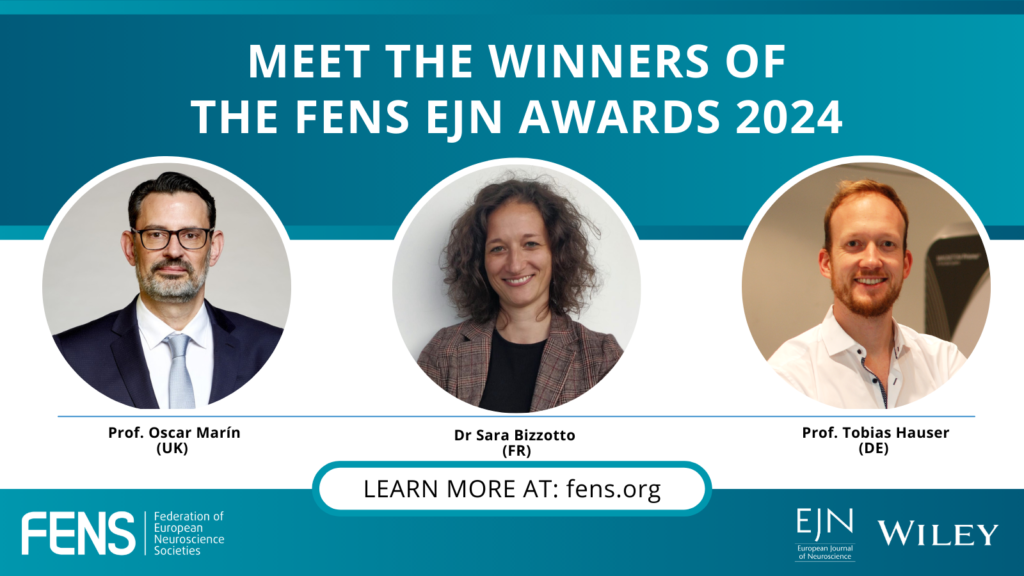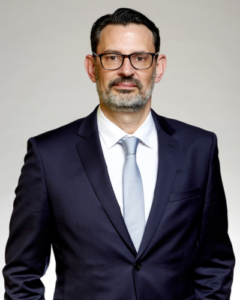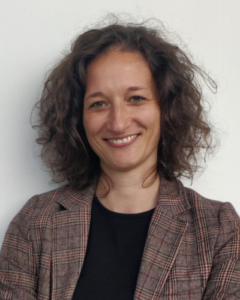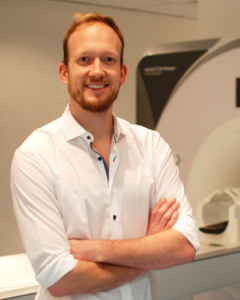
Meet the laureates of the 2024 FENS EJN Awards
27 April 2023
FENS News, Neuroscience News
FENS is proud to announce the winners of the 2024 FENS EJN Award and FENS EJN Young Investigator Prize. The awards recognise excellent scientific work in any area of neuroscience and outstanding contributions to neuroscience by early career researchers.
The winner of the FENS EJN Award 2024 is Professor Oscar Marín from King’s College London (UK), whose groundbreaking research has revolutionised our understanding of the cerebral cortex development, renovated views on the origin of neuropsychiatric disorders and introduced innovative concepts with transformative impact.
The FENS EJN Young Investigator Prize 2024 has two winners, Dr Sara Bizzotto (FR) and Professor Tobias Hauser (DE), both amazing early-career researchers, with remarkable contributions to brain research.
Sponsored by Wiley, these prestigious awards are £10,000 (FENS EJN Award) and £7,000 (FENS EJN Young Investigator Prize), respectively. The winners will also have the opportunity to give lectures at the FENS Forum 2024 in Vienna, Austria.
Congratulations to the awardees, and we are looking forward to hearing more about their ground-breaking neuroscience research!
FENS-EJN Award
The FENS-EJN Award is offered in recognition of outstanding scientific work in any area of neuroscience. The award is a personal prize of £10,000, sponsored by Wiley (publisher of EJN). In 2024, the FENS-EJN Award laurate is Prof. Oscar Marín.
Prof. Oscar Marín’s groundbreaking research has revolutionised our understanding of the cerebral cortex development, renovated views on the origin of neuropsychiatric disorders and introduced innovative concepts with transformative impact. Prof. Marín’s seminal work is an example of outstanding scientific inquiry and discovery. FENS and EJN are delighted to recognise his research through this well-deserved distinction.
Join us in congratulating Prof. Marín during the FENS Forum 2024 from 25-29 June 2024 in Vienna, Austria!
Meet Prof. Oscar Marín
 Oscar Marín is a Professor of Neuroscience and Director of the MRC Centre for Neurodevelopmental Disorders and the Centre for Developmental Neurobiology at King’s College London. He graduated in Biology and obtained a PhD in Neuroscience from Universidad Complutense in Madrid (ES), followed by postdoctoral training at UCSF. He was a group leader at the Institute of Neuroscience in Alicante before joining King’s in 2014. In 2005, he was selected as one of the founding members of the Scientific Council of the European Research Council, where he served until 2010. Prof. Marín is a Member of the European Molecular Biology Organization, a Fellow of the Academy of Medical Sciences, and a Fellow of the Royal Society. He serves on several editorial boards, including the Board of Reviewing Editors at Science, and has received multiple prizes, including the FENS-EJN Young Investigator Prize (2012), Prix Roger de Spoelberch (2014), and the Cajal Medal from the Spanish Royal Academy of Sciences (2017).
Oscar Marín is a Professor of Neuroscience and Director of the MRC Centre for Neurodevelopmental Disorders and the Centre for Developmental Neurobiology at King’s College London. He graduated in Biology and obtained a PhD in Neuroscience from Universidad Complutense in Madrid (ES), followed by postdoctoral training at UCSF. He was a group leader at the Institute of Neuroscience in Alicante before joining King’s in 2014. In 2005, he was selected as one of the founding members of the Scientific Council of the European Research Council, where he served until 2010. Prof. Marín is a Member of the European Molecular Biology Organization, a Fellow of the Academy of Medical Sciences, and a Fellow of the Royal Society. He serves on several editorial boards, including the Board of Reviewing Editors at Science, and has received multiple prizes, including the FENS-EJN Young Investigator Prize (2012), Prix Roger de Spoelberch (2014), and the Cajal Medal from the Spanish Royal Academy of Sciences (2017).
Find out more about the FENS-EJN Award.
FENS EJN Young Investigator Prize
The FENS-EJN Young Investigator Prize is awarded to early career researchers in recognition of their outstanding scientific contributions to any area of neuroscience. The award is a personal prize of £7,000, sponsored by Wiley (publisher of EJN). In 2024, the winners of the FENS-EJN Young Investigator Prize are Dr Sara Bizzotto (FR) and Prof. Tobias Hauser (DE).
 Meet Dr Sara Bizzotto
Meet Dr Sara Bizzotto
Dr Sara Bizzotto is a Horizon2020 MSCA Research Fellow at Paris Brain Institute (France). After obtaining a PhD in genetics and neurodevelopment from Sorbonne University in 2016, Dr Bizzotto joined the lab of Christopher A. Walsh at Boston Children’s Hospital/Harvard Medical School. During her postdoc, she studied genetic mosaicism in the context of brain development and developmental disorders, as well as in the aging human brain. Dr Bizzotto contributed to proving that postzygotic somatic mutations trace cell phylogenies in human tissues, providing novel insights into human brain development. She also contributed to showing that somatic mutation in the aging human brain occurs with cell-type-specific mechanisms and rates. With her research, Dr Bizzotto wants to address the cellular processes of human brain development and the insurgence of neurodevelopmental disorders, especially focusing on genetic mosaicism and lineage tracing of cell phylogenies.
Meet Prof. Tobias Hauser
Tobias Hauser is a Professor of Computational Psychiatry at the University of Tübingen and Honorary Associate Professor at the Max Planck UCL Centre for Computational Psychiatry and Ageing Research, and the Wellcome Centre for Human Neuroimaging, University College London. He is interested in the neurocomputational processes underlying learning and decision-making, and how these go awry in developmental psychiatric disorders. Tobias investigates how cognitive biases in obsessive-compulsive disorder (OCD) can help us better understand the neurocomputational mechanisms underlying this disorder. His primary focus is the influence of neurocognitive development on the emergence of psychiatric disorders during adolescence. In his work, he combines neuroimaging, pharmacology, and computational modelling in youths and adults with and without mental health problems. Tobias has received several prestigious prizes in psychiatry, such as the Robert L. Fantz Memorial Award (2023), the Philip Leverhulme Prize in Psychology (2021), the Emerging Leaders Prize in Adolescent Mental Health (2018) and the Kramer Pollnow Award (2017). His work is supported by Wellcome, European Research Council, Royal Society, European Research Council, Carl-Zeiss Foundation, Leverhulme Trust, Medical Research Foundation, Jacobs Foundation, Brain & Behavior Foundation and the Max Planck Society.
Find out more about the FENS EJN Young Investigator Prize.
About EJN
The European Journal of Neuroscience (EJN) is the official journal of FENS. FENS members have free access to EJN online and can enjoy a full, free and easy access to all published articles.
About FENS
Founded in 1998, the Federation of European Neuroscience Societies is the main organisation for neuroscience in Europe. It currently represents 44 national and single-discipline neuroscience societies across 33 European countries and more than 22,000 member scientists. Discover FENS and subscribe to our biweekly News Alert, with information on our latest calls and activities.